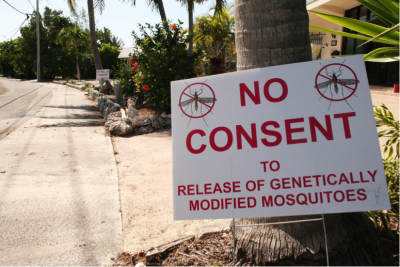FDA Subjects Floridians to GMO Experiment
- The FDA allows biotech giant to experiment in the U.S.
- GM mosquito deactivator switch rendered useless by common drug. Find out more…
- Discover how a tiny fish could be facing a GMO-heavy diet and how it may affect you.
Dear Reader,
“Yikes, the mosquitoes are really bad out here! It’s time to get some more fish.”
When I was a kid, I would spend my summers at a camp in the Florida Keys. I always noticed that the mosquitoes would get more intense toward the end of the sessions.
And one day, I finally figured out why… we needed more fish.
The Keys are full of areas with standing water –the perfect breeding ground for mosquitos.
And for many years, residents have reduced the numbers of these troublesome vectors with a safe, natural and effective solution – tiny fish called gambusia.
Gambusia can live in murky water and never need to be fed, because they eat mosquito larvae. This means they kill mosquitoes before they have the chance to become full-grown, disease-carrying menaces.
And luckily for Keys residents, these fish are easy to get…
If you have standing water, simply call the Florida Keys Mosquito Control District and they will bring you some of these minnow-sized fish.

Some areas of the Keys have gambusia channels. These areas were specifically designed to attract breeding mosquitoes so that the stocked gambusia could eat their larvae. Source: conchscooter.blogspot.org
Then just let these tiny assassins do their thing and violà, your mosquito situation is under control
But due to another poor and dangerous decision by the FDA, it looks like these little bug crushers are going to have some competition in the mosquito population control game.
Some genetically modified competition, to be exact.
![]() FDA Greenlights GMO Menace
FDA Greenlights GMO Menace
Last week, the FDA announced it’s approved the experimental release of genetically modified mosquitoes in the Florida Keys.
Releasing these winged mutations has been a possibility for this group of tiny islands for a couple of years, and even with strong community resistance, it’s now a reality.
Oxitec, a British biotech company, has been itching to get these GM mosquitoes into the Keys for years and are looking forward to unleashing these mutants into the environment.
And seems it like the first U.S. case of locally transmitted Zika virus was just the catalyst the Feds needed to greenlight their project.
The GM mosquitos are members of the Aedes aegypti species that carries Zika and other infectious diseases like chikungunya, dengue fever and yellow fever.
Male mosquitoes are unable to bite and will not be able to spread diseases. Furthermore, their greatest “feature” as highlighted by Oxitec is a special protein they are implanted with that will kill any offspring they create with wild female mosquitoes before they reach adulthood.
However, that does mean that these offspring may survive long enough to become part of the food chain.
These mosquitoes have already been released in Brazil, the Cayman Islands and Panama, but long-term environmental effects still remain unknown. And lots of folks are curious if it might affect their health directly.

Kieys neighborhoods show their resistance to the GMO experiments going on in their backyards. Source: NPR.org
For instance, the tiny gambusia fish eats mosquito larvae, and birds eat the gambusia and adult mosquitoes, and alligators eat birds, and people eat alligators. But it’s unclear if the GM mosquitoes moving up the food chain will have any negative health effects on animals and humans alike.
But what’s more frightening, the introduction of these mosquitoes is irreversible. Once they are out there, we won’t be able to find them if we discover they can cause problems in the future.
Oxitec reports that this is not a worry because the mosquitoes cannot breed.
But that’s not entirely true.
A report Oxitec released in 2012 reports that the GM mosquitoes have a 15 percent survival rate when a common antibiotic, tetracycline, is present in the environment. This is because the antibiotic can bind to their modified gene and inactivate it. This means their self-destruct function will never turn on.
Even a very tiny amount can repress the lethal protein. Since antibiotics are so prevalent, it’s quite likely some of these mosquitoes will thrive and could even create more wild mosquitoes in the right circumstances.
As for the residents of the Florida Keys, thousands of them aren’t thrilled about the FDA’s decision. A Change.org petition gathered 160,000 names after being started by Key West resident Mila de Mier. Many residents are upset that the experimental process is being carried out in their backyards – a fear they’ve never had with gambusia.
For now, because of emerging Zika cases, Keys residents and everyone else should protect themselves from mosquitoes, GMO or not.
Live well,

Natalie Moore
Managing editor, Living Well Daily Insider
Sources
[1]
Some Small Native Freshwater Fish Recommended for Mosquito and Midge Control in Ornamental Ponds
[2] What kind of fish do you put in standing water, how do I get them?
[3] Eliminating tetracycline contamination
[4] Genetically Modified Mosquito Study in Florida to Halt Spread of Viruses Sparks Eco Debate
Written By Natalie Moore
Natalie Moore is a dedicated health researcher with a passion for finding healthy, natural, and science-based solutions. After a decade of direct healthcare experience in western and natural medicine, she was involved in public health research before joining Living Well Daily.
View More Free Articles
Why Your Muscles Are Your Brain's Best Defense
Forget expensive brain scans and head-scratching cognitive tests that make you feel like you’re back in school. Japanese researchers have stumbled onto something that could change how we screen for memory problems—and it’s so simple, you’ll wonder why nobody thought of it sooner. A quick, painless measurement you can get during a routine checkup might...
Four Carbs that Could Add YEARS to Your Life
You’ve likely been avoiding carbs like the plague. Health gurus, fitness influencers, and diet books have convinced you that carbs are the enemy—that they spike your blood sugar, pack on pounds, and fast-track you to diabetes. So you’ve eliminated bread, sworn off pasta, and feel guilty just touching a piece of fruit. But what if...
Upgrade from Bananas and Apples to These Powerhouse Fruits
I’m often asked which fruits are the best. So, let’s talk about it. I’ll cut right to the chase: berries win this contest hands down. If you’re limiting your options to apples and bananas, you’re missing out on a universe of superior antioxidant power. Those everyday fruits are like bringing a knife to a gunfight...
The REAL Reason Americans are Getting “Fatter”
You’ve heard it a thousand times: “Americans are getting fatter because we’re lazy.” We sit at desks all day. We binge-watch Netflix instead of hitting the gym. We’ve traded physical labor for sedentary lifestyles. It’s a tidy explanation for why obesity has skyrocketed in developed countries. There’s just one problem—it’s completely wrong… A groundbreaking Duke...
Mailbag: Room Won't Stop Spinning? Do THIS First
“I’m dealing with vertigo issues, lightheadedness, and dizziness. As recently as this last Saturday I had multiple occurrences throughout the day. Is there anything I can do for this? I’m 69 and in good health. I work out 4 to 5 times a week.” —Spinning Hi Spinning, When patients approach me with similar complaints, I...
Hidden Number Secretly Sabotages Male Performance
Guys (and gals that love them), we should talk. You know how we’ve always been told that bedroom troubles are just part of getting older—that we just need to live with them? Well, it turns out that’s not true. Scientists recently wrapped up a six-year study that followed over 100 healthy men, and the findings...
Shocking Study Links Kids' Snacks to Dangerous Early Puberty
Kids are growing up in a world vastly different from the one we knew. Back in our day, if a child wanted something sweet, it was a piece of candy or a homemade cookie. Today’s kids are surrounded by products filled with artificial sweeteners that didn’t even exist when we were raising our own children....
Outdated Vitamin Guidelines Put Your Brain at Risk
If you’re like most people, you probably don’t think twice about vitamin B12—until your doctor mentions it during a routine blood test. But new research published in the Annals of Neurology suggests we need to pay closer attention to this crucial nutrient—especially as we age. Turns out, current guidelines for this essential nutrient might be...
The TRUTH About Supplement "Liver Dangers" REVEALED
There’s been a lot of buzz lately about liver damage from supplements—so, let’s talk about it. Reports of supplement-induced liver injuries have some folks wondering, “Could my natural remedy actually be harming me?” But before you toss all your supplements in the trash, let’s separate fact from fear—and talk about how to use supplements safely....
The 10,000 Steps LIE That's Ruining Your Health
I’ll be honest—I’m a little sick of the 10,000-steps theory. You know, the one that insists you need to take at least that many steps daily to stay healthy? You won’t believe where that claim originally came from. The 10,000-steps theory wasn’t handed down from the fitness gods on stone tablets. It originated from a...









